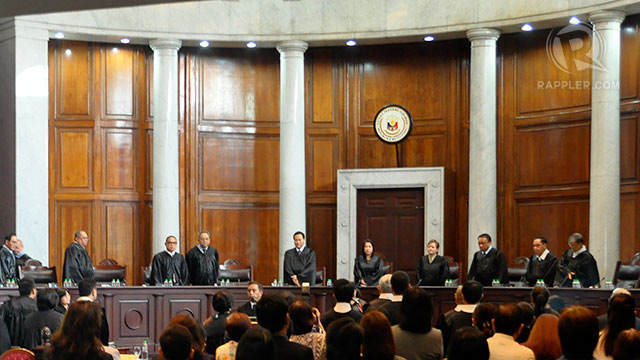 Today, January 12, 2016, in its first en banc session for the year, the Supreme Court is expected to decide whether to confirm or to quash the temporary restraining orders (TROs) issued by Chief Justice Maria Lourdes Sereno in relation to Grace Poe’s two petitions for a review of Commission on Elections (Comelec) rulings.
Today, January 12, 2016, in its first en banc session for the year, the Supreme Court is expected to decide whether to confirm or to quash the temporary restraining orders (TROs) issued by Chief Justice Maria Lourdes Sereno in relation to Grace Poe’s two petitions for a review of Commission on Elections (Comelec) rulings.
In the same session, the Supreme Court is also expected to act on the pending motions filed by the parties to the case, specifically:
- for the lifting of the Sereno TROs
- for the consolidation of the two certiorari petitions filed by Poe
At the outset, it must be noted that the Supreme Court rarely lifts injunctive reliefs like TROs pending resolution of cases, for reasons that I will later discuss. The more contentious related issue, however, is whether the Supreme Court en banc will confirm the TROs issued by Chief Justice Sereno.
It must be recalled that the TROs were issued by the Chief Justice without the en banc approval, as Grace Poe’s petitions were filed on December 28, 2015, during the High Court's recess. The Supreme Court’s own Internal Rules (AM Number 10-4-20-SC) allows such unilateral issuance of injunctive relief by reason of urgency. It is, however, subject to subsequent confirmation by the en banc.

However, I do not expect the SC to withhold that confirmation, or for it to lift the TROs, for the following reasons:
First, although it appears that the TROs were unilaterally issued by the Chief Justice, I am certain that she went through informal consultations with most members of the Supreme Court, as is the practice in most collegial bodies and considering the importance of the case.
The fact that those TROs were issued gives us more or less an idea of the leanings of the justices on this particular issue.
Second, in issuing the TROs, the Chief Justice herself already had a preliminary judicial determination that Grace Poe would suffer “great or irreparable injury” if the Comelec will not be restrained from cancelling her certificate of candidacy (COC).
The imminent danger here is her exclusion from the 54.4 million ballots to be used in the May 9, 2016, presidential elections, as the printing may begin anytime soon. This threat of exclusion is uncontrovertibly apparent, with statements emanating from Comelec, particularly from the controversial Commissioner Rowena Guanzon, threatening her exclusion from the ballot should Poe fail to get a TRO. I quote:
“'Pag inabot po sila ng deadline at 'di sila nakakuha ng TRO ay hindi ho sila ma'sasama sa balota. I'm not speaking about any particular candidate, 'yan lang po ang rule. Mas maganda na po na umakyat sa Supreme Court ang mga kasong ito…”
(If the deadline comes and they fail to get a TRO, then they won't be included in the ballot. I'm not speaking about a particular candidate, it's just the rule. Better that this case goes to the Supreme Court.)
If the Supreme Court does not confirm the TROs – in effect quashing them – it would be tantamount to admitting that its own Chief Justice erred in her factual and legal determination of the urgency of Poe’s application for injunctive relief.
There is no question at this point about the urgency of Grace Poe’s case, but on a public relation consideration, you simply do put your head of agency in such an awkward position.
Third, the lifting or quashing of the Sereno TROs at this point would render Poe’s cases moot and academic. Without those TROs, the Comelec can now exclude her name from the ballot, and her elimination from the 2016 presidential race becomes irreversible even if she later wins her case before the Supreme Court.
That is not expected as the Supreme Court understandably appears to be keen on deciding the cases of whether Poe is natural-born Filipino and whether she met the minimum residency requirement for a presidential candidate. Not only are the issues highly contentious and interesting, but of great national importance, considering that Grace Poe is one of the leading presidential candidates.
In fact, the High Court already set for January 19 the oral arguments on the other case questioning her citizenship – the petitioner who lost before the Senate Electoral Tribunal, which favored Poe, has elevated the case to the SC. The SC rarely allows oral arguments on a case; it reserves that for cases of transcendental importance.
It will be most logical if the cases (which started with two divisions of the Comelec) will be consolidated, considering the overlapping, if not identical, issues in the two certiorari petitions filed by Poe.
The purpose of consolidation is to prevent conflicting legal findings over the same set of facts and issues. From a practical pespective, consolidating the two cases will save the Supreme Court time and effort to write two separate decisions over the same issues which can only cause delay in its resolution. – Rappler.com
Emil Marañon is an election lawyer who served as chief of staff of recently retired Comelec Chairman Sixto Brillantes Jr. He is currently studying Human Rights, Conflict and Justice at SOAS, University of London, as a Chevening scholar.